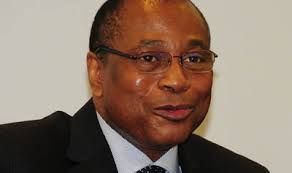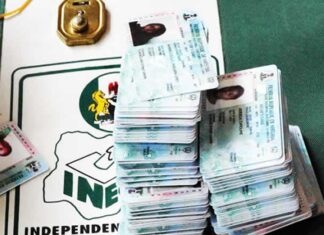Regulatory bodies are established to protect consumers but they have done more for themselves than for those they are supposed to protect, writes Goddie Ofose.
Consumers and industry practitioners are wondering whether government regulatory agencies will ever shift from their comfortable ground of rent-seekers lining their pockets to championing public good.
Eugene Juwah, NCC Executive Vice Chairman
This view emerged at the World Consumer Day symposium in Lagos.
The Consumer Protection Council (CPC), National Lottery Regulation Commission (NLRC), Lagos State Lottery Board (LSLB) and the Nigerian Communications Commission (NCC) have all harvested billions of naira into the treasury from sales promotions by organisations.
This year is expected to be the most profitable for these agencies. Banks, fast moving consumer goods, airlines, telecoms/ICT, e-commerce and beverages line up consumer/sales promotions.
In February, the NCC fined Airtel, Glo and MTN over N647 million for poor services to subscribers. The fine went to the government coffers.
The NLRC reportedly makes N600 million from 100 consumer promotions per year, the Lagos State Lottery Board rakes in N65 million from the same sector.
A marketing director of a multinational consumer goods retailer, who preferred anonymity, disclosed that his company pays N6 million on every consumer promotion to appreciate consumers for their loyalty.
Where consumer promotion is nationwide, he explained, the LSLB and NLRC and CPC all come into the picture. Telecoms firms also face these three bodies in addition to the NCC.
“By the time you have finished paying all their fees little or nothing is left for consumers,” he lamented.
Organisations recently began to migrate from other marketing strategies to sales promotions.
They include the banking, telecoms, ecommerce, alcoholic and non-alcoholic beverages sectors. Even the government has introduced lottery in the sale of its housing estates.
It is generally called sweepstake but smart marketing practitioners term it carrot marketing.
Sales promotion is now the biggest marketing investment, costing over N800 billion a year, compared with other platforms such as sponsorship, activation and direct sales.
The 2014 World Cup competition in Brazil has opened the floodgate. MultiChoice, TomTom, STAR and other brands have commenced ‘Road to Brazil’ promos.
The regulatory bodies have made their cut with little public benefit.
In contrast, the United Kingdom National Lottery Commission ensures a fair lottery, allotting £31 billion for good causes and £40 billion for prizes.
The first national lottery draw took place on November 19, 1994. Since then it has become an institution, raising over £31 billion for good causes and paying out over £40 billion in prizes.
About 70 per cent of adults play the lottery on a regular basis, and the crossed fingers logo is recognised by 95 per cent of the UK population.
Where the money goes depends on sales and the types of game sold.
The average breakdown of ticket sales over the course of the second licence was 50 pence paid to winners in prizes; 28 pence given to good causes; 12 pence to the government in lottery duty; 5 pence paid to national lottery retailers on all tickets sold and 5 pence retained by the operator to meet costs and give returns to shareholders.
In the Nigerian version, 20 per cent of proceeds or value of prizes goes to the National Lottery Trust Fund (NLTF) but how much of it is utilised for public good?
The National Lottery Regulatory Commission Act 2005 stipulates that 50 per cent of all proceeds goes for prizes and 20 per cent to the NLTF for good causes.
This means that 70 per cent of lottery money goes back to the people and 30 per cent to the operator to cover costs.
Good causes include investment in education, health, sports and special projects of national significance.
Individuals and/or civil society organisations with public projects can also access funds or grants from the lottery fund.
However, the regulatory agencies have been criticised for multi taxation and over regulation.
An industry practitioner, who does not want his name in print, said these bodies are supposed to be gatekeepers and protectors of consumers.
“Now, whether or not they are active and or doing it the right way is another. Quite frankly it is difficult to gauge their performance especially from a distance.
“Truth is fake promos still abound and consumers are exploited daily and nothing is done,” he stated.
“I cannot identify any impact they have brought to bear on the industry aside the endorsement of various promos by taking photographs with the officials of the various companies in question and hopefully for free.”
Caritas Communication Chief Executive Officer, Adedayo Ojo, cited the multiplicity of government agencies.
“I suppose that was the reason the Steve Oronsaye committee was set up. We expect that someday the government will come out with a white paper or implementation plan for the rationalisation of these agencies in line with the transformation agenda.”
Ojo argued that it is not fair to describe government agencies generically as “rent seekers” because “indeed we have several of them that have brought sanity to the sectors that they oversee.
“For example, the Nigeria Standards Organisation under Joseph Odumodu has been doing a hell of a job.”
A marketing journalist, Akin Adewakun, sees the regulatory bodies as a “necessary evil.”
He said since brands are no longer interested in long term marketing strategies, such as consumer promos, to push brands, regulatory agencies have become very imperative as gate keepers.
It is agreed that these agencies use their authorities to exploit brand owners. But it is risky, dangerous and calling for anarchy in the market place if there are no regulators to monitor how brands do business.
Emmanuel Jeminiwa of NLRC headquarters declined comment when The Niche contacted him for a response.













